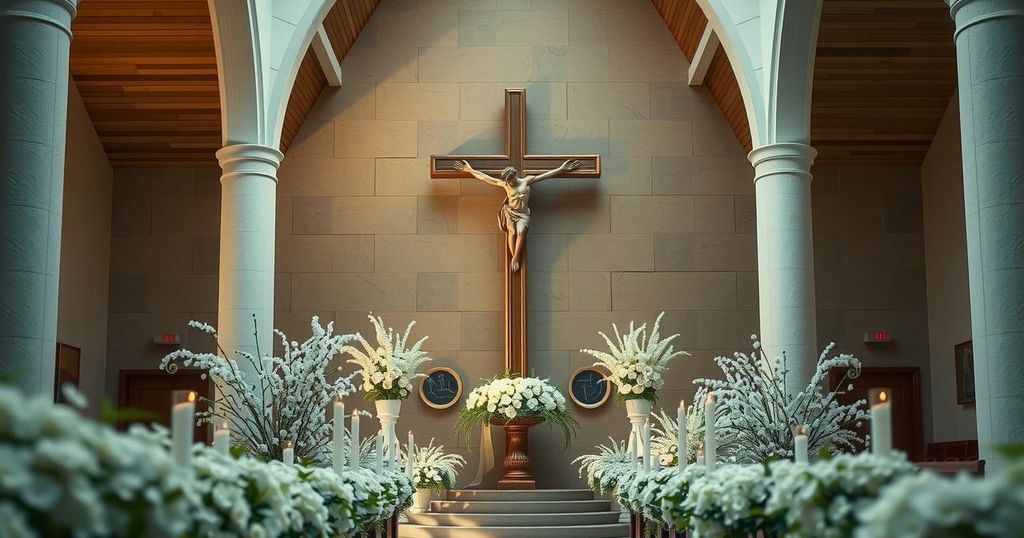Bishop Says Murder of Kenyan Priest Will Be “a Seed for New Life”
Fr. Alois Cheruiyot Bett, a Kenyan priest, was murdered in an ambush shortly after celebrating Mass. The killing has raised alarms about safety in a region plagued by banditry, with locals suspecting the attack was due to mistaken identity by criminals. Bishop Dominic Kimengich calls for change and justice, warning of a ripple effect on community safety and religious service in the area.
The tragic incident involving the murder of Fr. Alois Cheruiyot Bett has reverberated throughout the Diocese of Eldoret. The priest, known for his dedication at the newly formed St. Matthias Mulumba Tot parish, was killed on May 22 after celebrating Mass in the village of Kakbiken, Kenya. Gunmen ambushed him, firing multiple shots that resulted in immediate death, shocking a community already struggling with issues of poverty and violence.
Local residents suspect that bandits, believing the priest was spying for security forces, were responsible for the attack. Richard Ruto, a catechist at the parish, shared that detectives had visited Fr. Bett’s home just days before the ambush, intensifying fears that the bandits misidentified Bett’s intentions. This tragic event parallels the burial of another priest on the same day, emphasizing the rising danger faced by clergy in the region.
Bishop Dominic Kimengich addressed the incident during a requiem for Fr. Bett, expressing hope that this violent tragedy might serve as a “catalyst for change.” He mentioned that the young priest’s death could be a divine signal meant to prompt deeper reflection on peace and security in the troubled Kerio Valley. His remarks provided a mix of sorrow and a call for renewed vigilance against aggression in the area.
“We believe there is a reason behind everything that happens. It could be that God is talking to us,”` Bishop Kimengich articulated. His comments drew attention to a broader call for justice and a reassessment of security measures in response to the violent climate.
The bishop lamented the risk this incident poses to the willingness of other priests to serve in such a perilous environment. He urged both Church and state leadership to confront the issue of insecurity seriously, highlighting the detrimental impact on local priests and their congregations. “If priests say that they are not feeling safe, I can’t force them to go there,” he noted.
The violence has led to heightened concerns among educators, with many schools suspending operations. The Kenya Union of Post Primary Education Teachers (KUPPET) and the Kenya National Union of Teachers (KNUT) have called for schools to remain closed until the situation stabilizes. As John Cheberi, the Branch Secretary General of KNUT expressed, there is a growing apprehension about non-local teachers’ safety in the light of recent attacks.
“If a priest, a symbol of peace, can be targeted and killed for preaching peace, what will happen to teachers?” Cheberi questioned, underscoring that the violence is intertwined with tribal tensions in the area, threatening the stability of essential services provided by non-indigenous workers.
Amid the turmoil, law enforcement assured residents they were formulating strategies to enhance security. Deputy Inspector General of Police Eliud Lagat asserted that new measures were being enacted to protect educational institutions and ensure essential services could resume without fear. “Learning should go on,” he stated, attempting to restore confidence within the community.
The targeting of clergy has emerged as a disturbing trend in Kenya, with previous cases illustrating a pattern of violence against priests. Notable incidents date back to the early 2000s with various cases raising serious questions about clerical safety in the region. The recent spate of attacks creates an unsettling atmosphere for those committed to service, reinforcing the urgent need for systemic change to address the factors fuelling this cycle of violence.
In conclusion, the murder of Fr. Alois Cheruiyot Bett has raised alarm over the growing dangers faced by clergy serving in banditry-affected regions of Kenya. Bishop Kimengich’s remarks highlight a desperate need for comprehensive safety solutions, while educators and community leaders navigate the consequences of this tragedy. Ultimately, the situation calls for united efforts to restore peace and security, not only for religious figures but all community members living in these volatile areas.
The murder of Fr. Alois Cheruiyot Bett underscores the urgent need for enhanced security measures in Kenya, particularly for clergy and educators. Bishop Kimengich believes this tragic event could lead to significant change and greater accountability from authorities. The outcry for justice from unions and community leaders also reflects deep-rooted fears surrounding safety in the region. As violence continues to threaten lives, a coordinated effort is essential for restoring peace and ensuring the protection of all individuals within this community.
Original Source: www.catholicworldreport.com




Post Comment